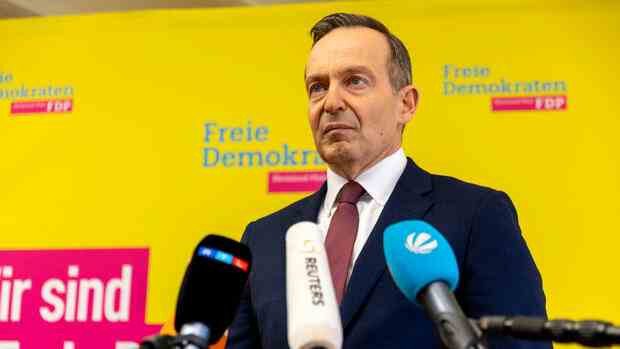The transport minister sees a solution in the combustion dispute.
(Photo: dpa)
Brussels The Federal Transport Minister looked a bit exhausted when he appeared in front of the cameras on Friday. Exhausting days lie behind Volker Wissing (FDP), until the end the dispute with the EU Commission in Brussels and the Green coalition partner in Berlin raged about the end of the combustion engine. But now a solution is emerging.
The Commission responded to his suggestions, said Wissing, “with a letter that makes me optimistic”. Although “last legal questions” still have to be clarified.
At the EU summit in Brussels, diplomats were also confident that an agreement was getting closer. Wissing claims the success for himself, his perseverance has paid off, he says. Banning the internal combustion engine “now makes no sense,” he said. “The end for the combustion engine off,” is how the FDP politician describes the compromise.
Specifically, the EU Commission and member states want to create a new vehicle class: cars that can only be refueled with synthetic fuels, so-called e-fuels, and are therefore climate-neutral, despite the combustion engine. To do this, the cars must be equipped with software that only allows refueling with e-fuels.
Technically it is possible. This vehicle class is then to be subsequently integrated into the EU emissions law, which would otherwise have cemented the end of the combustion engine in Europe from 2035 onwards.
The EU Commission is also satisfied
The Commission was also satisfied, because the EU’s climate package, which has already been agreed in principle, will not be untied again. In an exchange of letters, both sides had recently come closer. Earlier this week, the commission agreed to release a statement on e-fuel cars. This should contain concrete dates for further regulatory proposals.
The EU and Germany could be close to an agreement in the combustion dispute.
(Photo: dpa)
She also wants to classify e-fuel vehicles as climate-neutral in another law, the Euro 7 directive. Wissing’s ministry responded on Thursday evening with a counter-offer. He demanded a public declaration, signed by Timmermans or Commission President Ursula von der Leyen, that the agency would present a legal act by the autumn.
This should state that all vehicles fueled with e-fuels will also be permitted after 2035. Second, the Commission should implement its offer to classify e-fuel cars as climate-neutral as soon as possible. An agreement has now been reached on this line.
The debate about phasing out combustion engines had led to considerable upset in Brussels. The fact that the law on emissions standards in the transport sector was blocked by Germany, Italy and some other countries “risks undermining the credibility of the legislative process at EU level,” wrote EU Parliament President Roberta Metsola in a letter.
>> Read also: Electronics instead of filler necks – the EU Commission comes up with an e-fuel proposal FDP to
Green MP Anna Deparnay-Grunenberg even said that the FDP was becoming a “deal killer” and was disqualifying Germany as a reliable partner. The federal government had already approved the emissions law in Brussels, until the FDP changed direction at the last minute and questioned the compromise again.
Commission chief Ursula von der Leyen warned on Thursday evening that a solution had to be found quickly. Wissing, on the other hand, emphasized this week that one day more does not matter, after all, it is about a law that should apply from 2035.
But even among the EU member states, the German tactics met with a lack of understanding. Latvia’s Prime Minister Krisjanis Karins warned that the entire architecture of European decision-making would fall apart if everyone behaved like Germany.
More: The traffic light noise about the internal combustion engine damages Germany’s reputation in the EU
